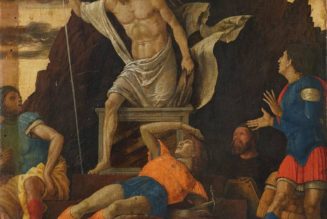
This Sunday, the Third Sunday of Advent Year C, Gaudete or “Rejoice” Sunday, John the Baptist solemnly pronounces what exactly will separate the chosen and discarded, and Paul backs him up in the second reading.
The thing that will reveal that we are worthy of God is not what we think — but it brings more joy than we will ever experience without it.
In short, we can rejoice this Advent if we have told God honestly that we love him, using the only language he will accept: Our actions.
This Gospel passage follows last week’s, proclaiming John as the “voice of one crying out in the desert: Prepare the way of the Lord!”
In between that Gospel and this one, he tells the crowds, “You brood of vipers!” and says that being “sons of Abraham” is worthless. Only “producing good fruit” will keep them safe.
He says the same to us: Self-identifying as good Christians, or “orthodox Catholics,” will not guarantee us anything. And so a few people ask, on our behalf, “What then should we do?”
John answers three groups. To the crowd in general, he says: “Whoever has two cloaks should share with the person who has none. And whoever has food should do likewise.” To a tax collector, he says, “Stop collecting more than what is prescribed,” and to a soldier, “Do not practice extortion, do not falsely accuse anyone, and be satisfied with your wages.”
He doesn’t set them on a study program, or a prayer regimen. He doesn’t want them to pay lip service to God. He doesn’t tell them to have faith that they are safe and sound.
But he doesn’t tell them to be radical either. They don’t have to join John in the desert eating what they can find — they don’t even have to stop collecting taxes for the cruel Romans or renounce the violent ways of the military life.
What he wants them to do is show to God and neighbor their love with the ultimate honesty, their actions, exactly where they live and work.
To live moderately and generously is at once easier than what we expect from John the Baptist and much harder than we want.
John the Baptist doesn’t just call for moderation in our state in life; he surrounds the call with cataclysmic images that are the opposite of the images that warm our hearts at Christmas.
- We expect a babe in a manger. But John says, “One mightier than I is coming.”
- We are picturing someone too young to do anything for himself. But John says, “I am not worthy to loosen the thongs of his sandals.”
- We are thinking of herald angels and a distant star. John says: “He will baptize you with the Holy Spirit and fire.”
- We are thinking of the “holy infant so tender and mild,” laying in the hay. John says “His winnowing fan is in his hand to clear his threshing floor and to gather the wheat into his barn, but the chaff he will burn with unquenchable fire.”
We of course have a point: The Christ Child is indeed the one who is coming, and who is all that a newborn king implies.
But the reason the Church puts these frightening images of God in Advent is to train our feelings and sharpen them. To understand how astonishing Christmas is, we have to remember that God is a “consuming fire;” and “it is a fearful thing to fall into the hands of the living God.”
God becoming man cannot just mean warm cozy feelings; it should unsettle us and make us overhaul our behavior to be more generous to others and less indulgent of our own faults.
Ironically, only this kind of hard work actually brings joy.
Think of the coming of the Christ at Christmas this way: Imagine you are living in land torn by civil war, where you can no longer trust your neighbors, and where you are vulnerable and alone. Nobody knows who is an enemy and who is a friend.
But a mighty one is coming who loves you, will die for you, and who will lead you to glory by his side. Without him, you are lost; with him you are saved. And all it takes to be with him is to behave with honor. You would be filled with joy when he comes, no matter how hard things are or how much worse they get.
This is exactly the situation we are in, and so “Rejoice in the Lord always. I shall say it again: rejoice!” says Paul.
Then he gives the same advice John gave the crowds: “Your kindness should be known to all.”
And that also causes us to rejoice because, as research shows, “kindness make you happy and happiness makes you kind.”
If you live your life trying to make yourself happy, maximize your comfort and getting away with whatever you can, you will be anxious, addicted and distracted. If you live your life for others you will have peace.
But Christians can take that joy to another level — a supernatural level — and experience “the peace of God that surpasses all understanding.”
We are not just in this world, being kind to others; we have a foot in the other world, experiencing the presence of Jesus Christ himself.
Specifically, we have a sacramental connection to God. The “Psalm” this week is actually from Isaiah and it can be read (and has been read) as a commentary on the sacramental life.
- “With joy you will draw water at the fountain of salvation” we pray — and that means our baptism is a continual source of rejoicing for us.
- “I am confident and unafraid. My strength and courage is the Lord,” it says — describing the gifts of the Holy Spirit that come from confirmation.
- “Cry with joy and gladness, for among you is the great and holy one of Israel,” it says, describing what is absolutely true for us who see him on the altar at every Mass.
This closeness with the Lord, with him living and acting among us, is precisely what was predicted in the First Reading: “The Lord, your God, is in your midst, a mighty savior; he will rejoice over you with gladness.”
Christmas is coming, and Jesus is already here, in the sacraments. The real joy of Christmas is the joy of being close by the side of Jesus and able to honestly telling him we love him — with our actions as well as our words.
Image: Markus Grossalber, Flickr
Join Our Telegram Group : Salvation & Prosperity









